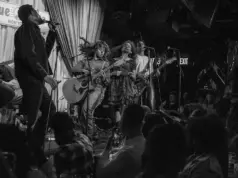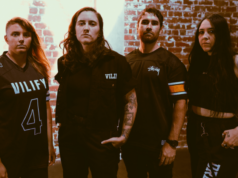

Being a music writer is a lot of fun, and there’s no one I like to talk shop with more than Charles Benoit. He writes for Reggae Steady Ska about his favorite genre, ska. He also plays tenor sax in Rochester’s most active ska band, aptly named Some Ska Band. They’re opening for The Pietasters on Saturday, April 27 at Flour City Station. We recently caught a quick bite over lunch to talk ska.
Paula Cummings: Some Ska Band… How did you guys come up with that name?
Charles Benoit: Well that was a bad move on my part. It was the first thing that came up. I wanted to start a band with three other guys at the agency. Marshall, that was the guitarist and he’s creative director there. Will, our web developer. And Shad, the videographer. Marshall said, “I’ll do the logo. What’s the name of the band?” The first thing I came up with was Some Ska Band and we went with that. I probably should’ve thought it out a lot more, but it kind of works because Ska bands are such a niche market. Let’s say a band was coming to town called The Plastic Cups. OK, I don’t know anything about them, and I never heard of them. They don’t give any descriptors. I thought it was kind of funny. “Well, who’s playing tonight at The Bug Jar?’ ‘Some Ska Band.’ ‘I like ska, which one?’” We’re the ‘Who’s On First?’ of Ska Band names.
PC: I know you can’t speak for the others, but why ska? You’ve been all over the world, and exposed to all kinds of music. What brings you back to ska?
CB: I can speak to the others, and say they play ska because I forced them to. I was only interested in starting a ska band and that’s it. I was first introduced to ska in 1979 when somebody handed me the first Specials album. It changed my life. I fell in love with the message of Two-Tone: the racial unity, fighting against corruption in big government, and the little man view. It’s always attracted me. So I stayed with ska, and quickly ran out of two-tone albums because there were only a handful of bands. I found myself going back to the old traditional original ska of the Skatalites Desmond Dekker, and all the early originators. There was so much there to fall in love with. And then third wave ska came around and you had The Toasters and The Pietasters and all that kind of action that was going on. It’s been a lifelong interest for me. I just love the appeal. “Oh, it’s repetitive, it’s simple, it doesn’t get very deep.” Well, that’s me: repetitive, simple, and I don’t get very deep. It’s what I’ve always liked about the music. As for the rest of the band, none of them came to the band as ska fans, but I think they’re all pretty committed to the cause.
PC: I’ve noticed that you guys do a lot of covers that are not were not originally written as ska songs.
CB: It’s something ska band do. The Skatalites, the originators of the sound back in the early 1960s, one of their first songs they are known for is “The Guns of Navarone.” They took a song and put it to the ska. It’s been a tradition. If you think a song is good, make it better by putting it to the ska. You can take a crappy song and make it better by putting it to the ska.
PC: In your band’s description it says that you guys got together with the dream of pulling off the biggest diamond heist the world has ever seen. It wasn’t a robbery, but you recently acquired a gem that you played the album release.
CB: One of my favorite songs in the ska genre is “Easy Snappin’.” It was written by Theophilus Beckford. I got a chance to talk with Monty Alexander once, the famous piano player. He was in the room when they started developing the sound of the ska. Jamaica was newly independent. They were trying to come up with the sound that was strictly Jamaican, not the stuff coming out of Cuba or the Trinidadian soca sound. They wanted something unique to them. They were literally sitting around in the studio and the musicians started playing an upbeat – Ernest Raglin started playing the upbeat. And they messed around with it. Theo Beckford started playing piano. This is early. It is not ‘63. This is late ’50s, but they knew independence was coming. So they’re playing with the sounds and Beckford pumps out this piano tune called “Easy Snappin’.” It’s the first ska song that was deliberately written to be that. When we did our CD release party at The Record Archive, I wanted to let people know about that. I wanted to make that connection. So through a record collector Darren Reggae, that’s not his real name, I got an original 45 that I played at the show.
PC: In addition to playing ska music, you also interview musicians.
CB: I interview them for Reggae Steady Ska, which is the world’s leading international ska and reggae website. It’s based out of Bonn, Germany. I’ve been writing for them for about five or six years. This is a great great chance to get to meet some of my heroes. I wouldn’t have been able to meet them at the show, but going through using the website as a writer I get ‘backstage.’ I’ve talked to Monty Alexander, Horace Panter of The Specials, Robert “Bucket” Hingley from The Toasters, Stephen Jackson of the Pietasters. They’re all willing to share because ska is such a small community.
PC: Some Ska Band plays with some big-name bands. I saw you open for Bim Skala Bim last year.
CB: We’ve played with The Pilfers, which are a on the harder side of ska. We’ve played with El Grande. And we’ll be playing with The Pietasters on the 27th. This is a pretty big deal, because my wife says that after the Pietasters, Some Ska Band is her second favorite.
PC: To whom or what would you attribute keeping the flame of ska alive here in western New York?
CB: The person who is bringing some of these bigger names is Adam Smith. Adam Smith is such an incredible powerhouse. It’s such inspiring story for anybody, of any fan of any music. Adam doesn’t play music, doesn’t sing – God no, he doesn’t sing. He loves music, all kinds of music. But he has a special place in his heart for ska. He had his favorite band, The Pilfers, and they were just never coming to Rochester. He couldn’t figure out why they weren’t coming. So I jokingly said to him ‘Why don’t you play promoter and bring the bin in the town?’. Fast forward about a year later, and he and Coolie Rand of Pilfers run a management company called Elevation. They are handling tours and shows all over the country. It’s a cool story about Adam, but the cooler story is if you like music, you can become a promoter. You do risk losing some money, and I don’t think Adam is ever going to get rich doing this. But, he’s bringing in bands he really loves, and getting to host the parties he’d want to go to. So if you’re a fan and you want your bands in town, don’t wait for someone else to bring them. Play promoter and bring them in.
PC: Some Ska Band released an album earlier this year. Will that be available at the Pietasters show?
CB: We’ll have the CD for sale, bargain price of five bucks. You can’t beat that. We appeared in a CD What Do You Know About Ska Punk Volume 2. That’s got 167 songs on it, believe it or not. That’s five bucks. We’ll have T-shirts and stuff like that.
PC: Anything else you want to add?
CB: This show we’re welcoming MC Lopez. She’s gonna be joining us on keyboard.
PC: So that’ll bring you up to nine members.
CB: We have a tradition in the band: at shows, people are often meeting other people in the band for the first time. And that’s going to be the case at this show. The rhythm guitar player will not have met the keyboard player until we’re there. And here’s the thing – we like bringing people from the audience up on stage. So we’re nine people when we start, but we’ve been a lot more than that when we’re finished!
Catch Some Ska Band with The Pietasters and The Pandemics Saturday, April 27 at Four City Station in Rochester. Tickets are on sale now. And be sure to follow Some Ska Band on Facebook for updates and events.
Photo by Will Browar


![Maggie Rose Talks ‘No One Gets Out Alive’, Don Hart, Gamehendge, & Her Triumphant Ham Sandwich [Interview] IMG 1604](https://utterbuzz.com/wp-content/uploads/2024/04/IMG_1604-238x178.jpg)





